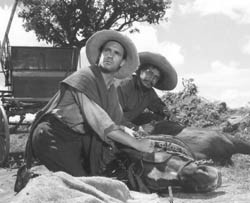Nazarín
Mexiko 1958, 94 min.
Director: Luis Buñuel
Producer: Maňuel Barbachano Ponce
Based on: román Benita Péreze Galdóse
Screenwriters: Luis Buñuel, Julio Alejandro
Director of Photography: Gabriel Figueroa
Cast: Francisco Rabal, Marga Lopéz, Rita Macedo, Ignacio Lopéz Tarso,
Noé Murayama, Jesús Fernández and others.
Awards: International Prize at Cannes Film Festival 1959
|

|
Mea culpa, mea culpa, mea maxima culpa.
The opening formula of a catholic mass (admission of general guilt and of the presence
of sin) could be the subheading of Buñuel´s Nazarín. Perception of sin from
Christian perspective, the struggle between earthliness and spiritual values, the
position and role of faith in the society - these are the main themes the picture deals
with.
Nazarín is set in Mexico at the turn of the 20th century. The passage to a new
era is symbolized by a short scene showing the installation of electricity in a shanty
town. The occupants of the house oppose the electrification, which demonstrates their
unwillingness to believe anything that doesn´t fit in their existing traditional
classification. The same happens to Christian belief - in the strictly practical
reality where one has to fight for his place in the sun, faith is reduced to blind
invoking of superstitions and obscurantism, both applied to daily life situations.
Somehow there is no time left to meditate about life after death or the Last
Judgment...
The world outlined above is the place where the priest Nazarín lives. The scope of his
spiritual influence is limited by the profane existence of others. The fact of being a
priest predestines him to giving alms, offering shelter and resolving nonsense disputes.
As God´s servant he loses all dignity, in the eyes of others, whose way of thinking and
acting is profane, he is not more than a "Holy Joe" without real might and power.
As spectators we perceive him differently from the beginning. His perfectly altruistic
attitude to the world offers clear and evident parallels with Christ´s fate. In this
respect Buñuel goes very far - Nazarín wanders from one humiliation to another, meets a
prostitute and makes her believe, performs a miracle, becomes the "king" of the damned,
desolate and forsaken and at the end of his pilgrimage, martyrdom might be awaiting him.
Just like Christ, Nazarín experiences an inner journey terminated by the metaphorical
scene in which he gets a pineapple as alms. With the bells rigning, Nazarín joins
sinners by accepting the fruit symbolizing the apple from the tree of the knowledge
from the woman.
All characters the priest meets are loaded with sin, their corruption is intensified in
the typical Buñuelesque way and quite clearly gradated. From the perspective of
Christian dogmatics, all the seven deadly sins are present in the film in one way or
another. Anger and lechery are emphasized most. Anger and hatred towards
fellow-creatures is found almost everywhere by Nazarín, and the most painfully in the
scene with a group of workers whose envy (another deadly sin) makes him leave. When he
is slowly going away, one of the men hits his back with a stone, which in an ironic way
leads again to the Bible ("If any one of you is without sin, let him be the first to
throw a stone at her.") The priest eventually loses his fight against anger - at
the end he is led in chains as an outcast, his social excommunication being thus
completed. Neither does he manage to defeat lechery - the dying woman sends him away,
wishing to stay with her husband and her lover (as Buñuel himself admitted, this scene
is inspired by Sade´s Dialogue between a Priest and a Dying Man); the girl who
has marched a long way with him eventually returns to her despotic lover with whom she
had experienced moments of obscene sexual pleasure.
By creating Nazarín, Buñuel joined the directors who left behind themselves
pictures belonging to the "priest movie" pseudo-genre. The protagonist is a priest,
servant of the spiritual power, who is confronted not only with society but also with
doubts about the rightness of his mission. Other films akin to Nazarín include
Diary of a Country Priest (Robert Bresson), Under the Sun of Satan
(Maurice Pialat) or Winter Light (Ingmar Bergman).
In comparison with these films, Nazarín is much more uncompromising and critical
of society. In Nazarín, being virtuous and incorrupt implies being a martyr.
"My God, my God, why hast thou forsaken me?"
Eli, Eli, Lama, Sabachthani
"Of all the films I have shot in Mexico, Nazarín is one of those I like best.
Actually it was received well, even if there were some misunderstandings concerning
the real meaning of the film." (L.B.)
"It is useless to be concerned with priests´problems." Jacques Prévert
Plus:
At Cannes Festival in 1959 the film won the International Prize.
Despite being a confirmed atheist, Buñuel quite often deals with the topic of
Christianity - cf his films The Golden Age, Viridiana, Simon of the Desert etc.
Nazarín is a film version of the novel by Benito Pérez Galdós, a Spanish
classic who was the greatest critical realist of the late 19th century. Galdos
intentionally continued in local traditions (picaresque novel, Cervantes) and in the
manner of Balzac, he created a monumental work counting 36 novels, 46 episodes from
national history and 24 plays.
[ translation: Sabina Poláková ]
|
|